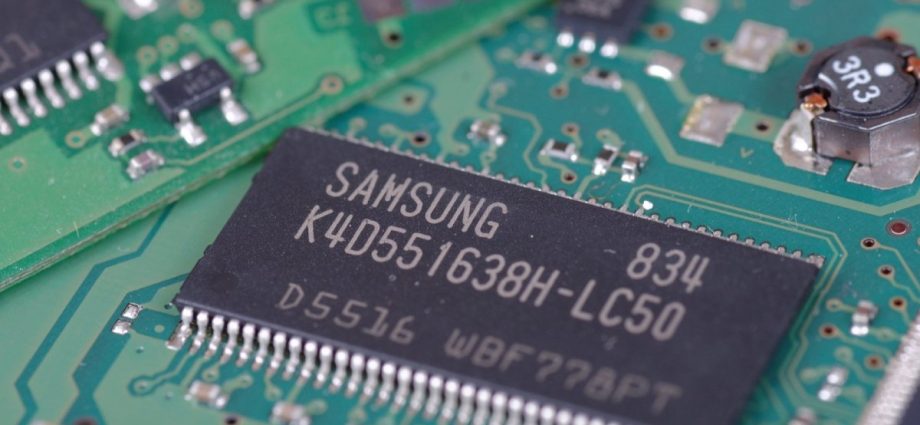Samsung Electronics is planning to fully automate its semiconductor factories by 2030, with “smart sensors” set to control the manufacturing process, according to South Korean media reports.
The world’s largest maker of memory chips aims to create an “artificial intelligence fab” that operates without human labor, the reports said. The ground-breaking project is reportedly already underway, the same reports said.
Samsung has signaled since last summer it aims to AI to optimize integrated circuit (IC) design, materials development, production, yield improvement and packaging. Identifying the cause of defects in the production process is reportedly a top priority of the AI plan.
Samsung is developing its own sensors and switching procurement from foreign to domestic suppliers to gain control of the technology and develop relevant South Korean expertise. Measuring plasma uniformity in deposition, etching and cleaning is one key application; real-time monitoring of production processes is another.
The technology will be applied both to Samsung’s DRAM and NAND flash memory operations and its contract manufacturing operations. Catching up with Taiwan’s TSMC and staying ahead of America’s Intel are of vital importance to Samsung as die-shrinks progress from 3nm now to 2nm by 2025 and 1nm late in the decade.
The finer the circuit line widths, the greater the risk of microscopic defects dragging down chip production yields. Deploying AI to keep the problem to a minimum is increasingly critical to maintaining competitiveness. A completely automated factory would also eliminate the risk and cost of human contamination.

Samsung’s new sensors are reportedly small enough to fit on existing production lines, enabling the upgrade of current facilities while saving space.
This is important because Samsung currently has the largest wafer processing capacity in the semiconductor industry with more than a dozen production lines in South Korea, China and the US. All of the facilities are reportedly candidates for smart sensor upgrades.
Samsung is preparing to build a new chip factory in Texas and plans to add five new “state-of-the-art” production lines in South Korea by 2042 at a total cost of about 300 trillion won (US$230 billion).
The five domestic lines will be built at a new industrial complex in Yongin, south of Seoul, where Samsung will work with about 150 suppliers, IC design companies and research institutions. Those facilities are likely to be completely automated.
Last March, the South Korean government issued a statement saying, “The mega cluster [in Yongin] will be the key base of our semiconductor ecosystem… [to] leap forward as a leading country in the middle of fierce global competition over advanced industries.”
“Timing is everything in the semiconductor industry,” Samsung Semiconductor CEO Kyung Kye Hyun said according to reports. “It is most important to start the construction of the Yongin National Industrial Complex early to maintain dominance amid intensifying global semiconductor competition.”
Samsung is also building a new semiconductor R&D center in Yongin. When he visited the site last October, Samsung Electronics Executive Chairman Lee Jae Yong said, “We need a turning point for innovation that leads us to take another leap in the semiconductor business amid ongoing internal and external risks.”
Samsung Electronics expects to report operating profits for the fourth quarter of 2023 of between 2.7-2.9 trillion won, which would be an increase of 11% to 19% over third-quarter profits. Sales are expected to remain more or less unchanged, but memory prices have started to recover while costs come down.
Despite global macroeconomic uncertainty, Samsung’s management expects continued improvement in chip market conditions in 2024. Higher sales and profits, in turn, will make it easier to fund the automation of existing production lines and the construction of new AI-powered factories.
Samsung kept semiconductor capital spending roughly flat in 2023 amid a cyclical downturn. In 2024, the company should resume its long-term upward investment trend, with a focus on increasing the production of high-bandwidth memory used with AI accelerators.

AI is both a productivity-enhancing tool and a new growth market for memory chip makers like Samsung, SK Hynix and Micron. SK Hynix is working with Gauss Labs, an industrial AI solutions developer with offices in Palo Alto, California, and in Seoul.
The AI start-up’s “Panoptes virtual metrology” solution is already being used to optimize thin film deposition in SK Hynix factories and more applications are reportedly in the pipeline.
Micron, meanwhile, has its own internally developed AI to optimize production. “We have built something here that is completely differentiated. We’re seeing much, much higher levels of accuracy,” said Koen de Backer, Micron’s vice president of smart manufacturing and AI.
“We can now launch products twice as fast while improving productivity by 10%. It’s truly been transformative. You could say it’s a killer app,” the Micron executive claimed.
With that competition, Samsung’s completely automated AI fab is a strategic imperative, not an option, in a chip-making landscape fastly being reshaped by AI.
Follow this writer on X: @ScottFo83517667

